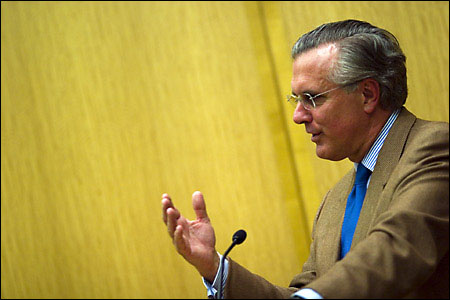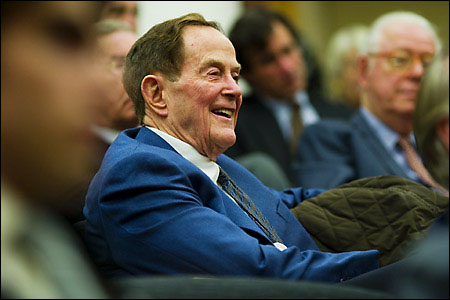Globalization and monetary policy discussed
Fed’s Fisher says economic ‘verities’ must be rethought

Maybe it wasn’t quite “the end of history” that Richard Fisher described during the Manshel Lecture in American Foreign Policy last week (Nov. 3).
But it was definitely a world where economic history “just ain’t what it used to be,” as Yogi Berra might have put it.
Fisher, who since March has been the president and chief executive of the Federal Reserve Bank of Dallas, was describing how the productivity gains of the past 20 years, plus the growing global workforce, have combined to confound traditional notions of how much an economy can expand before tightness in labor markets leads to wage inflation. The Phillips Curve – the graphic representation economists use to track these things – is going to have to be redrawn, he suggested.
In his lecture, on the topic of globalization and monetary policy, Fisher strung together a number of key phrases from economist Joseph Schumpeter, who taught at Harvard from 1932 to 1949, to give the essential plot: “The opening up of new markets, foreign or domestic … revolutionizes the economic structure, … destroying the old one, creating a new one. … [It] upsets all conditions of location, all cost calculations, all production functions, … and hardly any ways of doing things which have been optimal before remain so afterward.”
He didn’t use the popular phrase “the end of the business cycle,” which is sometimes invoked to describe this phenomenon. But he clearly is bullish on prospects for the global economy to continue to grow with low inflation and low interest rates.

As part of his preparation for his job in Dallas, Fisher spent some time in Cambridge over the past winter reading, among other things, “A Term at the Fed,” by former Federal Reserve Gov. Larry Meyer.
“Meyer’s book is a real eye-opener because it describes in great detail the learning process of the [Federal Open Market Committee] members as the U.S. economy morphed into the new economic environment of the second half of the 1990s.”
Economic growth was strong and accelerating, and unemployment was as low as it had been in decades. Traditional models were telling the Fed governors and presidents that it was time to put on the brakes.
“They were frustrated by Chairman Greenspan’s insistence that they postpone the rate hikes they were proposing, yet perplexed that inflation wasn’t rising. Indeed, inflation just kept on falling,” he said.
If the advice of Meyer and other close observers of the traditional metrics had prevailed, he suggested, the Fed would have shut down the expansion, causing the economy to underperform seriously.
“According to some back-of-the envelope calculations by economists I respect, real GDP would have been lower by several hundred billion dollars. Employment gains would have been reduced by perhaps a million jobs. The costs of not getting these critical calibrations right would have been huge.
“Now, how was Greenspan able to get it right when other very smart men and women did not? Well, we now recognize with 20/20 hindsight that Greenspan was the first to grasp the fact that an acceleration in productivity had begun to alter the traditional relationships among economic variables.”
This was in large part because he is such a “superb listener,” Fisher said – in continual conversation with America’s business leaders. “The information age had begun rewriting their productivity manuals. Earnings were being leveraged by technological advances.”
New econometric models are going to be needed to track the new economy, Fisher suggested, adding that while these quantitative instruments are being fine-tuned or even overhauled, qualitative research – such as Greenspan’s very careful listening – will be essential to monetary policy.
Fisher cited a recent Wall Street Journal report that the U.S. economy grew at 3.8 percent for the third quarter of this year – its eighth consecutive quarter at about that rate, which, the Journal noted, was above what most economists consider the economy’s natural growth rate.
But, Fisher asked, “How can economists quantify with such precision what the U.S. can produce with existing labor and capital when we don’t know the full extent of the global labor pool we can access? Or the totality of the financial and intellectual capital that can be drawn on to produce what we produce?”
The global workforce has expanded as tens of millions of post-Soviet Russians, hundreds of millions of Chinese, and 100 million-plus English-speaking Indians have come onto the labor market.
“Here is my poster child for what I consider the miracle of international money markets,’ he said, quoting the Financial Times of Oct. 28: “‘Vietnam yesterday raised $750 million with … a dollar denominated … 10-year bond. Investors put in orders totaling $4.5 billion, six times the amount on offer. During trading in New York … the bond … was priced to yield 7.125 percent.’
“When I was at Harvard, we were killing the Vietnamese. Now we are financing them, and at low rates.
“I seriously doubt that had central bankers here or elsewhere in the world not managed their affairs in a manner that discourages inflationary expectations, this would be anywhere near possible,” Fisher said, adding that the “well-functioning, reliable monetary regimes central banks have been sustaining” have been critical to the progress of emerging economies around the planet.
“One cannot make monetary policy without being aware of the forces of globalization acting upon our economy. Nor can one be oblivious to the need for us to conduct our policy without an awareness of how what we do impacts markets, and therefore, economic potential, worldwide.”
Fisher’s address was the fifth Warren and Anita Manshel Lecture in American Foreign Policy, sponsored by the Weatherhead Center for International Affairs and delivered Nov. 3 in the Tsai Auditorium, CGIS South. He noted that the views he expressed were his own and do not necessarily reflect official positions of the Federal Reserve System.




